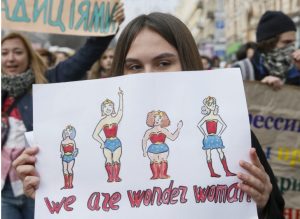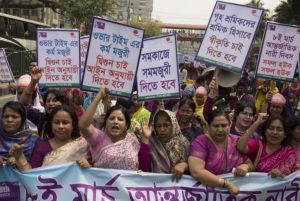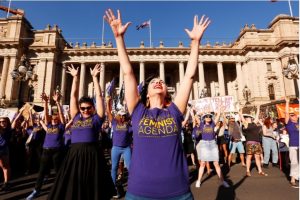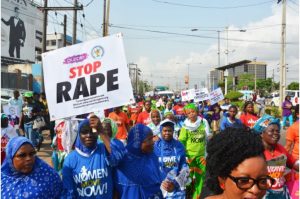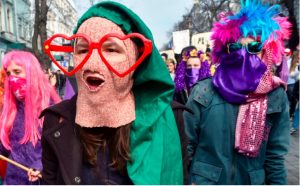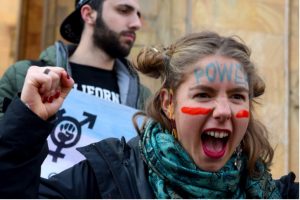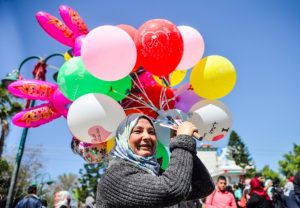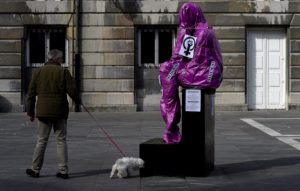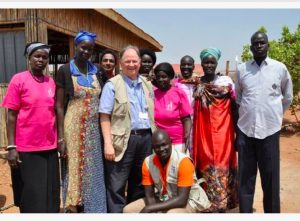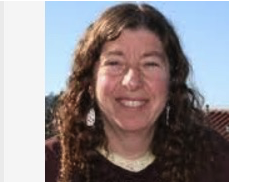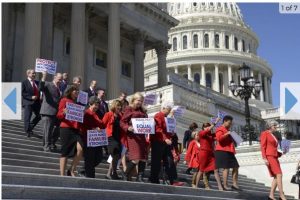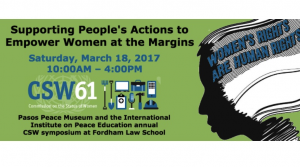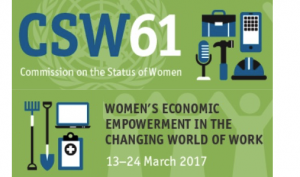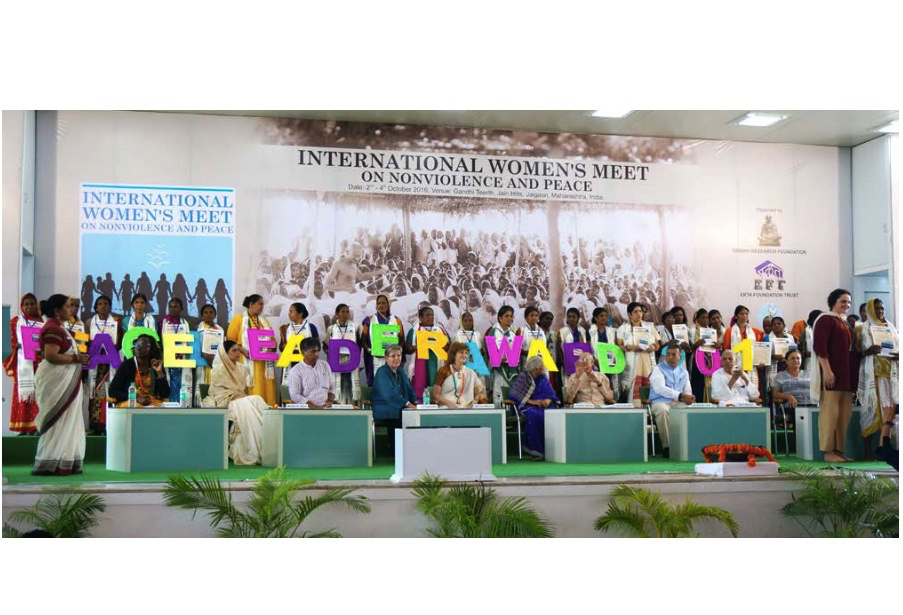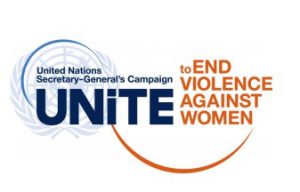. . WOMEN’S EQUALITY . .
An article from the Coalition for the International Criminal Court (abbreviated)
This International Women’s Day – 8 March 2017 – we join the UN in calling for gender balance in the work force. To provide just that inspiration we are celebrating the women leading the fight for global justice for the worst crimes. Be brave when you find gender perspectives are missing: countless of our civil society representatives from around the world have dared to break the mold – so can you. Read their stories and be inspired.
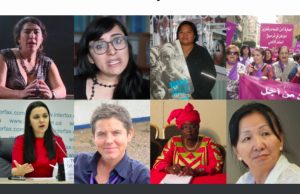
Photos of the 8 women described below in order upper left to lower right
(click on photo to enlarge)
Adriana Maria Benjumea Rúa, Director – Corporación Humanas Colombia
Adriana Maria Benjumea Rúa is a lawyer, researcher and feminist whose work with Humanas, including on the issue of gender and political influence, has led to the organization becoming a leading advocate of inclusive perspectives in the Colombian peace process.
Adriana is the director of Corporación Humanas Colombia. As a lawyer, researcher and feminist working on the issue of gender and political influence, Adriana’s work includes the important work of monitoring public policies around care for victims and ensuring that they are not implemented without a gender perspective.
Adriana’s extensive socio-legal research on gender justice and violence against women in armed conflicts as well as her strategic litigation work in cases of sexual violence in transitional justice frameworks have contributed to the leading role of Humanas among civil society engaging in the Colombia peace talks. . .
Nancy Lopez – Lawyer – Comisión Mexicana de Defensa y Promoción de los Derechos Humanos
Together with a team of committed men and women from the Mexican Commission for the Defense and Promotion of Human Rights, as well as victims and their families, Nancy Lopez confronts issues of justice denied in Mexico, exploring possibilities for international justice before mechanisms like the ICC.
With the Comisión Mexicana de Defensa y Promoción de los Derechos Humanos, Nancy plays a critical role within Mexican civil society by bringing into focus the country’s need for the global fight against impunity – to ensure the non-repetition of international crimes like enforced displacement, enforced disappearance, torture, executions and sexual crimes in the country; but also to lay groundwork for solutions to many of Mexico’s social issues.
With the Comisión Mexicana coordinating Mexican civil society activities around the ICC, Nancy advocates for the Mexican government to honor its commitment to ensure that international justice is respected and enforced, and that the state abides by its obligations as an ICC member state. Such advocacy has included pushing Mexico to implement the Rome Statute, including its pivotal state cooperation provisions. . .
Rebecca Lozada – National Coordinator – Philippine National Coalition for the ICC
A year after Rebecca Lozada took the helm of the Philippines National Coalition for the ICC, the Philippines became the 117th ICC member state. Setting an example for the majority of states in Southeast Asia, with Rebecca’s coordination Philippines civil society has been mobilizing to ensure a framework is in place to deliver those who commit the most egregious international crimes to justice.
Under Rebecca’s leadership, the Philippines national Coalition for the ICC (PCICC) has been working to ensure individual perpetrators of the most heinous crimes – genocide, war crimes and crimes against humanity – are brought to justice. In 2010, one year after Rebecca took up the position of National Coordinator of the PCICC, the Philippines government ratified the Rome Statute to become the 117th ICC member state. . .
(Article continued in the right column)
Question for this article
Do women have a special role to play in the peace movement?
(Article continued from the left column)
Brigitte Chelebian – Executive Director – Justice Without Frontiers
Brigitte Chelebian is an Attorney at Law and the Executive Director/Founder of the organization Justice Without Frontiers (JWF), which works towards the advancement of international criminal justice– the first organization of its kind in Lebanon. In a part of the world with little support for the Rome Statute system, JWF campaigns for the ratification and implementation of the Statute within national laws, including promotion of the rights of women who are victims of armed conflict and sexual violence.
As Founder of Justicie Without Frontiers, Brigitte has led pioneering work in Lebanon and the wider Middle East to promote the rights of atrocity victims, including women and children affected by sexual violence in conflict, build stronger national and regional institutions to protect against these crimes, and create access to legal support for victims. . . .
Tetiana Pechonchyk – Chairperson – Human Rights Information Center
Tetiana Pechonchyk is a leading advocate for international justice in her home country, Ukraine, where her and her organization’s first-of-its-kind work from 2014-2016 documenting crimes in both occupied and government-controlled territories continue to make the global fight against impunity a reality in Ukraine.
As Chairperson of the Human Rights Information Centre (HRIC), Tetiana conducts one-of-a-kind work to raise awareness and seek justice for victims throughout Ukraine’s conflict-affected areas. Despite political challenges to her organization’s work, Tetiana and HRIC continue to fight for justice both on occupied and government-controlled territories of Ukraine. . . .
Brigid Inder – Executive Director – Women’s Initiatives for Gender Justice
. . .Brigid Inder, OBE, is the Executive Director of the Women’s Initiatives for Gender Justice (WIGJ). Among her many efforts with the Women’s Initiatives, Brigid’s influential advocacy with the International Criminal Court (ICC) since 2004 has been applauded for helping to establish the investigation and prosecution of sexual and gender-based crimes as a substantive priority within the work of the OTP.
As the Prosecutor’s Special Advisor on Gender from 2012-2016, Brigid co-wrote the Policy on Sexual and Gender-based Crimes with the Office of the Prosecutor, the first such policy developed by an international court or tribunal. Through WIGJ’s advocacy on the ICC’s substantive work, along with its focus on the integration of women within legal proceedings as well as the institutional development of the ICC with respect to gender and geographical diversity amongst elected officials and senior managers, Brigid supports the ICC in becoming an institution capable of delivering on its mandate and ensuring women and gender issues are included within the Court’s structures and its justice outcomes. . .
Mama Koité Doumbia – President – Malian National Coalition for the ICC and Board Member – Trust Fund for Victims
Mama Koité Doumbia has made an impressive career in promoting women’s rights and gender-justice related issues. She continues to fight tirelessly in multiple capacities to reinforce women’s access to justice and empowerment within her home country of Mali, across the African continent and in many supranational organizations.
Among her many roles and experiences, Mama Koité is well known nationally and internationally as a union leader, teacher and determined activist in finding ways to reinforce the capacities of women’s NGOs. She fights passionately against social injustice and violence. Mama Koité has worked with the Women’s Coordination of Mali, and she was President of the African Women’s Development and Communication Network (FEMNET) in Nairobi, Kenya, from 2003 to 2010. From 2005-2014 she also chaired the Gender and Related Issues Cluster and vice-chaired the Economic and Social Council of the African Union. Mama Koité also worked as a member of the Réseau Paix et Sécurité de l’Espace CEDEAO/Mali. She is a founding member of the Réseau Mondial Francophone Egalité Femmes Hommes.
Urantsooj Gombosuren – Chairperson – Asian Forum for Human Rights and Development (FORUM-ASIA)
As chairperson for FORUM-ASIA, Urantsooj works towards the strengthening of human rights and gender-equality in Asia.
Based in Bangkok, Thailand, FORUM-ASIA has worked alongside human rights defenders and other civil society organizations in Asia for over 25 years promoting and protecting human rights in the region. FORUM-ASIA works to enable a sustainable environment of peace, justice, and gender-equality based on collaboration, advocacy, and cooperation. They conduct their work throughout Asia and across the globe. . .
(Thank you to Janet Hudgins, the CPNN reporter for this article.)
